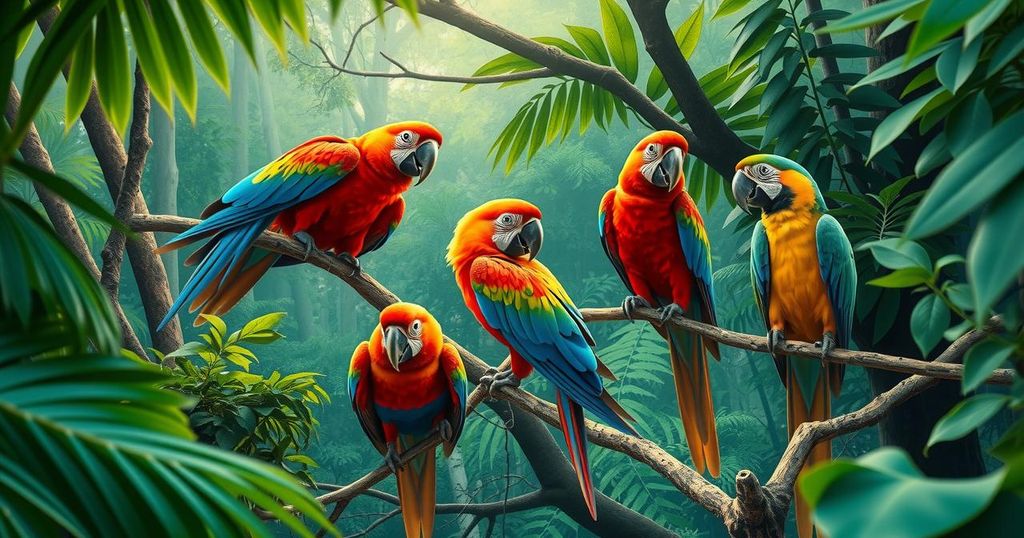World news
ABUJA, AFRICA, COMMUNITY ENGAGEMENT, CONSERVATION, ECONOMIC IMPACT, FABIAN EKER, KADUNA, LAGOS, MARK OFUA, NATIONAL ENVIRONMENTAL STANDARDS AND REGULATIONS ENFORCEMENT AGENCY, NATURAL DISASTERS, NESREA, NIGERIA, NIGERIA REPRESENTATIVES OF THE GROUP, NPS, PANDRILLUS NIGERIA DRILL RANCH, WEST AFRICA, WILD AFRICA, WILDLIFE, WILDLIFE CONSERVATION
Fatima Alavi
0 Comments
Advocacy Group Urges Increased Protection for Parrots in Nigeria
Wild Africa and World Parrot Trust demand urgent protection for parrots in Nigeria, citing the illegal trade’s threat to their survival. Recent enforcement actions by Nigerian authorities indicate progress. However, the groups insist on the need for continued public education and legislative support to combat the ongoing crisis and protect these keystone species.
Two prominent groups, Wild Africa and the World Parrot Trust, are urgently calling for enhanced protective measures for parrots in Nigeria, coinciding with World Parrot Day. A joint statement issued in Lagos emphasizes the alarming rise of illegal parrot trade and the pressing need for conservation efforts. The statement underlines the significance of parrots in ecosystems, noting their role in seed dispersal and forest regeneration.
The African Grey Parrot, once abundant in Nigeria, has been drastically declining due to years of trapping and trafficking. Despite existing national and international laws aimed at protecting these birds, enforcement is lacking. The illegal exotic pet trade continues, leading to the shocking statistic that about 1.2 million wild-caught grey parrots have been recorded in international trade over four decades, with 40 to 60 percent perishing during capture and transportation.
Recent months have seen some positive developments in Nigeria’s efforts against this nefarious trade. In March, the Nigeria Customs Service made headlines by intercepting over 300 parrot heads, showcasing the cruelty behind the trade. Moreover, three suspected traffickers were apprehended in Abuja by officials from the National Environmental Standards and Regulations Enforcement Agency (NESREA) and the National Park Service (NPS), who found live grey parrots among their haul. Previously, in April, officers seized 12 live grey parrots being smuggled between Kaduna and Lagos, with the birds now receiving care at Pandrillus Nigeria Drill Ranch.
Dr. Mark Ofua, Wild Africa’s spokesperson for West Africa, highlighted the ecological importance of parrots, calling them keystone species. He pointed out that their decline indicates the health status of entire ecosystems. “Parrots are not just beautiful and intelligent—they serve as vital ambassadors for our planet,” Ofua remarked, urging people to protect their habitats.
Similarly, Ifeanyi Ezenwa, the Nigeria Country Coordinator for the World Parrot Trust, expressed concern for grey parrot populations, stating that they face severe threats. He noted the importance of ongoing enforcement efforts by NESREA, NCS, and NPS but lamented the public’s lack of awareness regarding the exploitation of these important birds.
Encouragingly, Nigeria has taken significant steps, such as introducing the Endangered Species Conservation and Protection Bill, aimed at combatting the illegal wildlife trade. The groups stress the urgency for this bill’s speedy passage to bolster conservation initiatives. They also advocate for increased public education to diminish demand for parrots as pets.
Completing their call to action, Wild Africa and the World Parrot Trust urge collaboration among governments, businesses, and individuals to take decisive steps toward safeguarding parrots and ensuring their future in the wild. Their message is loud and clear: fruitful efforts are necessary before it is too late for these iconic birds.
In summary, the Wild Africa and World Parrot Trust are advocating forcefully for stronger protections for parrots in Nigeria, emphasizing the critical consequences of illegal trade and habitat loss. Recent arrests show some progress in tackling this issue, but much more is needed. Public awareness and support for legislative action are essential if Nigeria’s parrots are to be saved from further decline. The groups call for united efforts from diverse sectors to prioritize the conservation of these vital species.
Original Source: nannews.ng




Post Comment